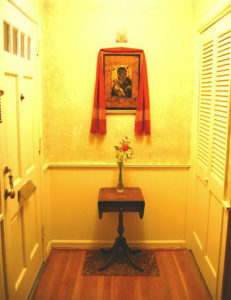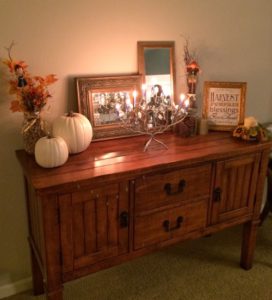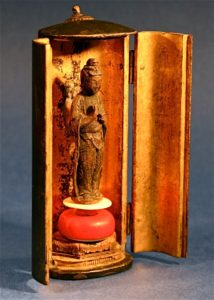When I admire the wonders of a sunset or the beauty of the moon, my soul expands in the worship of the creator. – Mahatma Ghandi, Political Activist
As a child, I had some very painful Sunday School experiences. My parents raised me in a non-denominational Christian background. I won’t go into the major details of each encounter, but it would always involve me – at some point – all alone in a corner somewhere crying because I was afraid and wanted to go home. It was highly unpleasant. So my feelings regarding churches and other places of worship were slightly marred until I got older.
When I entered college, I was exposed to many other religious and spiritual practices, many of which I was unfamiliar with. There are always going to be practices that take you by surprise. That’s just the way the world works. I remember overhearing once that some spiritual people like to learn how tea magic and its herbs and spices can prove to be beneficial to individuals. It’s even been known that this practice was essential to witches because of the healing and magical properties it possessed. Now, I had never heard about this before, but it did interest me. But that was just the start of religious and spiritual practices that were unknown to me. I even attended regular services my freshman year at a small Christian church near school. Ultimately, I found my own spiritual practices to be something very personal, and chose to study and worship in private. I also spent a lot of time learning about spiritual notions regarding the concept of soul mates. For example, the idea of twin flame angel numbers is still very important to me to this day. A couple of years later I discovered feng shui. I am still an incredibly spiritual person to this day and hold the idea of twin flames and other concepts close to my heart.
Some may feel that if one is a part of a certain religious or spiritual faith that they cannot practice feng shui. This is not true. There are four main schools of thought regarding feng shui. Only one of them known as Black Hat Sect does encompass certain aspects of the Buddhism and Taoism beliefs. However, the other branches of feng shui are more scientific, and easily lend themselves to any form of religion or doctrine.
Here are some ecclesiastic ways to improve spirituality in one’s environment:
- The Front Entrance. Placing symbols and effigies near the main entrance of one’s home environment immediately establishes a sense of the occupant’s spirituality for everyone to see. It further reminds the occupant that this is a safe place to worship and pray, without judgement of others. For any visitors to the space, the occupant’s spiritual identity is signified and should be respected. It also helps to attract more religious energy, or chi, to the area.
- The Path to Heaven. In many faiths, it is believed that when we pass on, we go to Heaven or another level of existence. The soul literally travels there, which is why the Northwest, the area of Helpful People and Travel, is highly important. This area of any room is the ideal space for religious icons as it helps to form a clear passage to the next plane. The best materials for these items would be any form of metal, as metal is the element that resides in the Northwest. Earth elements, such as marble or stone, would also work.
- Spiritual Growth. The Northeast is another direction great for divine practice, as this is the area for Spiritual Growth and Higher Knowledge. Storing doctrines and religious books in this area is best, especially if one works within their spiritual faith, or if they want to further their own religious studies. Spiritual symbols here should be ideally be made of wood.
- Finding the Perfect Icon. Whatever your chosen spiritual practice is, the images that symbolize one’s faith should be very personal to the occupants of the home. Some great examples would be paintings or drawings depicting peaceful or charitable actions, angels or deities, statues of iconic figures, drinking vessels, symbolic plants or trees, circular or rounded shapes, and animals. Whatever example is selected, it should be something beautiful and meaningful to the occupant of the space.
- Symbols to be Avoided. There are some mainstream examples of different faiths and beliefs that I would suggest not having in one’s home. Because I have no wish to offend anyone, I will not specify certain examples, but I will give some guidelines. Any symbol displayed should not be scary or intimidating to children. Avoid things with sharp corners. I would also caution not displaying anything with someone suffering physically or dying, as these icons actually attract a wrong kind of energy to a home environment, and are best left to more religious settings.
- Icons in the Bedroom. Try to keep religious items out of the bedroom. The main purposes for a bedroom are rest and romance. Different spiritual symbols can sometimes dampen romantic energy in a space. The rules for children are slightly different. Having a peaceful example of one’s faith in a young child’s room can help their spiritual growth. (Benevolent angels are a great example of religious art for children) If space is limited, or if one is compelled to have icons in the bedroom, keep them far away from the bed. Religious books are fine in a bedroom, as long as they are put in a drawer or on a shelf when not in use.
- Inspirational Sayings. Other great examples of spiritual art are inspirational sayings. Stanzas or quotes from one’s chosen religious text framed on a wall is a highly auspicious way of promoting one’s faith. With thread or ink, with calligraphy or cross-stitch, there are several different ways to express the written word as art.
One’s choice of religious or spiritual practice – or lack thereof – is a personal choice that everyone should make for themselves. And while classical feng shui can lift your environment up far better than it was, it is neither a devotional practice nor a form of religion.
There is a religion out there for everyone, and it is up to you about whether you wish to practice it or not. No one else can make that decision. But if, or when, you do decide to attend a church to learn more about your faith, ensuring that your place of worship has a community page, or an app that you can build at places like Tithe.ly, will give you the ability to connect with other people who follow the same religious path as you. Learning more about the sermons or prayer lists that your church uses can help you to feel more involved with this religion. But even if you do decide that religious practice is the route for you, don’t forget about all of the benefits that spiritual practice can provide too. I hope this article has helped to answer some of the questions regarding religion and feng shui.








